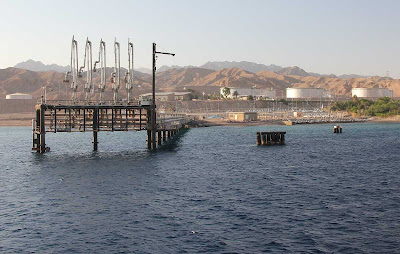Oil import terminal, Eilat.
Israel's government on Sunday gave the green light to building the first
rail link between its Mediterranean and Red Sea coasts, offering a new
Asia-Europe trade route to compete with the Suez Canal.
"This is a strategic decision," Prime Minister Benjamin Netanyahu told ministers at the cabinet's weekly meeting.
"In the coming decade, new (economic) powers will arise," a statement
from his office quoted him as saying. "It is within our power to create
an alternative transport route, bypassing the Suez Canal."
At an initial cabinet meeting on the project last week, Netanyahu said
the plan had "created very great interest among the emerging powers,
China and India, and others."
Te project also envisages a passenger line through the Negev desert which would
for the first time would put Israel's southern Red Sea resort of Eilat a
two-hour train ride from Tel Aviv, 350 kilometres away. The electrified rail line will reach top speeds of 300 km
per hour, allowing it to complete the trip in two and a half hours. The route will include 63 bridges and five tunnels.Statutory planning of the line has already begun, and is expected to be
completed by the end of 2012. Construction is expected to take another four years.
Netanyahu's office said the first stage would be to choose between
three alternative financing schemes -- a bilateral agreement "between
Israel and another government," a partnership between the Israeli
government and local investors, or full government funding.
The transport ministry says its preferred option is a joint project with China. On its website it said that minister Yisrael Katz met China's transport minister in Beijing last September
and the two agreed to prepare a joint proposal for the Eilat link.
Israeli officials say a so-called "Med-Red" railway could also be used
for future exports of gas to India, and possibly China, from
Mediterranean fields currently under development. The two biggest Israeli finds, Tamar and Leviathan, lay respectively
about 80 and 130 kilometres (50 and 80 miles) off the northern port city
of Haifa.Tamar is believed to hold at least 8.4 trillion cubic feet of gas (238
billion cubic metres), while Leviathan is believed to have reserves of
16 trillion cubic feet (450 billion cubic metres).In June, an Israeli company announced the discovery of two new natural
gas fields, Sarah and Mira, around 70 kilometres (45 miles) off the city
of Hadera further south along the Mediterranean coast.
-

.jpg)



No comments:
Post a Comment